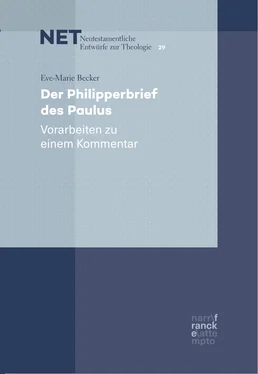1 ...6 7 8 10 11 12 ...32 I shall add here a philological remark to Phil 3:9, where MelanchthonMelanchthon, Philip(p) quotes the Pauline text, while he only alludes to it in the cases of Phil 3:8 and 3:12 (see above). In the case of Phil 3:9 the Pauline text obviously is of specific theological importance. It seems as if Melanchthon does not have the Vulgata-text in mind but that he himself translates the Greek text: Melanchthon’s Latin text is much closer to the Greek than contemporary Latin translations, especially when it comes to the complicated interpretation of the prepositions that are used here:
The Vulgata-text says: … sed illam quae exfide est Christi quae exDeo est iustitia infide.
The Greek text, however, says: … ἀλλὰ τὴν διὰπίστεως Χριστοῦ, τὴν ἐκθεοῦ δικαιοσύνην ἐπὶτῇ πίστει – a phrase that is much better expressed in MelanchthonMelanchthon, Philip(p)’s translation in his Loci : … sed eam, quae perfidem est Christi, quae iustitia exdeo estMelanchthon, Philip(p)8 – perfidem equals διὰπίστεως.
The art of Greek philology finally leads MelanchthonMelanchthon, Philip(p) to a significant concept of “faith”: Melanchthon’s translation – even though it might reflect reformatory theology here – is much more than the Vulgata-tradition close to the Pauline Greek in a philological sense. Melanchthon’s expertise as a Greek philologist is an important contribution to the reformatory movement since it attests to the reformatory movement in humanism.Melanchthon, Philip(p)9
2.2. MelanchthonMelanchthon, Philip(p)’s exegetical principles in his Loci in light of the “New PerspectiveNew Perspective”
In his interpretation of Pauline texts, such as Phil 3, MelanchthonMelanchthon, Philip(p) is in his Loci strongly influenced by a “Lutheran hermeneutics.” Melanchthon approaches his reading of Phil 3 through the lenses of the theologoumenon of justification by focusing his interpretation on lex, gratia and iustificatio as key terms. Even if Melanchthon is concise regarding matters of Greek philology, he tends to narrow Pauline thinking to the concept of justification. The suspicion regarding the paradigmatic of a “Lutheran readingLutheran reading of Paul,” raised by the representatives of the “New PerspectiveNew Perspective,” seem to be legitimate – it even applies to Melanchthon’s exegesis of Pauline texts.
Nevertheless, the NPP-critique of a “Lutheran Paul” that was dominating Protestant exegesis and its preunderstanding of Pauline texts in the sense of a “Western reading” falls much too short. This becomes evident in two points:
(1) The critique of the “Lutheran Paul” as articulated by the representatives of the NPP is not new. It is rather typical of protestant theology – in line with Lutheran tradition – to question its dogmatic and hermeneutical framework constantly. One of these selfSelbst, self, selfhood-critical debates took place in 1916 between Wilhelm BoussetBousset, Wilhelm (1865-1920) and Paul Wernle (1872-1939). Bousset – in his refutation of Wernle’s critical remarks about Bousset’s monograph “Kyrios Christos” – raised the issue of to what extent protestant theology as a hermeneutical key can legitimately lead Pauline exegesis.Gefühl(e)Bousset, Wilhelm1 As Bousset and Wernle, as well as all subsequent protestant theologians, are diverse interpreters of Paul and LutherLuther, Martin, the history of (protestant self-)critique still continues. Likewise, Ed P. Sanders and Krister StendahlStendahl, Krister have formulated their critique of previous Lutheran theologians and their approaches to Pauline exegesis.
Today we have to continuously work out how we can further develop our research perspective on Paul and Pauline reception history up to the reformation period and its impact on modern Paulinism. The task of interpreting LutherLuther, Martin and Paul is per definitionem infinite. Rudolf BultmannBultmann, Rudolf, who was himself frequently under suspicion as a representative of the so-called “Lutheran Paul,”2 was quite sensitive of the various dilemmas of the Paul-and-Luther-reception. Bultmann himself pointed out how Luther’s interpretation of Pauline texts does not only provide helpful insights into the interpretation of Paul’s letter-writing but also tends to narrow or even conceal Pauline thinking:Bultmann, RudolfLuther, Martin3 Before judging about Luther’s reading of Paul , we have to work on an appropriate understanding of Luther . The “Lutheran Paul,” in other words, cannot be restricted to a fixed paradigm or a concise hermeneutical concept – Luther as an exegete of Paul is himself part of a dynamic process of reception history. We thus have to prepare for a careful understanding of Luther and Luther’s exegesis of Pauline texts first.
(2) At the same time, we cannot take all protestant theologians or all protestant writings with the same brush: We have to distinguish between LutherLuther, Martin and MelanchthonMelanchthon, Philip(p) as we have to distinguish between the Loci Communes and other types of reformatory literature – either written by Melanchthon or other theologians. Even though certain theologoumena – such as the justification- theologoumenon – have consistently been brought up by reformatory theologians, there is no uniform “reformatory Pauline exegesis.” We have to study Luther and Melanchthon differently – we have to look at them as individual theologians and authors and we even need to distinguish between the different types of writings that derive from the same author.
I shall thus in a final step look at a different writing of MelanchthonMelanchthon, Philip(p) – dating to 1546 – where he, in contrast to the Loci , approaches Paul’s letter to the Philippians from a rather different perspective.
3. MelanchthonMelanchthon, Philip(p)’s interpretation of Philippians in his Oratio (1546)
We will now turn to a text that has generally not been counted among the most central writings of MelanchthonMelanchthon, Philip(p): Melanchthon’s funeral speech on LutherLuther, Martin (“ Oratio in funere reverendi viri D. Martini Lutheri ”). However, this text gives a good impression of Melanchthon’s view on both Luther and Paul in 1546. After a complicated history of transmission that cannot be discussed here,1 the “ Oratio in funere reverendi viri D. Martini Lutheri ” has been edited again in 1997.
In his funeral speech on LutherLuther, Martin, MelanchthonMelanchthon, Philip(p) chooses a prominent literary type of an oratio that is known from antiquity: the laudatio funebris laudatio funebris. In his speech, Melanchthon though claims several times that he would differ from the ancient prototype (… tantum de mortui laudibus …)Wischmeyer, OdaMelanchthon, Philip(p)2 since he would not intend to hold a laudation. This assertion, however, rather functions as an introductory trope.
MelanchthonMelanchthon, Philip(p) starts by placing LutherLuther, Martin in the list of de viris illustribus , which reaches from Adam to Johannes Tauler. Hereafter Melanchthon compares the regents of big ancient empires – Solon, Themistocles, Scipio and AugustusAugustus – with leaders of the church, such as Isaiah, John the Baptist, Paul, Augustine and Luther who, of course, exceed the former group of ancient figures. Afterwards, Melanchthon portrays Luther as a humanist and a teacher of the church.
Читать дальше












